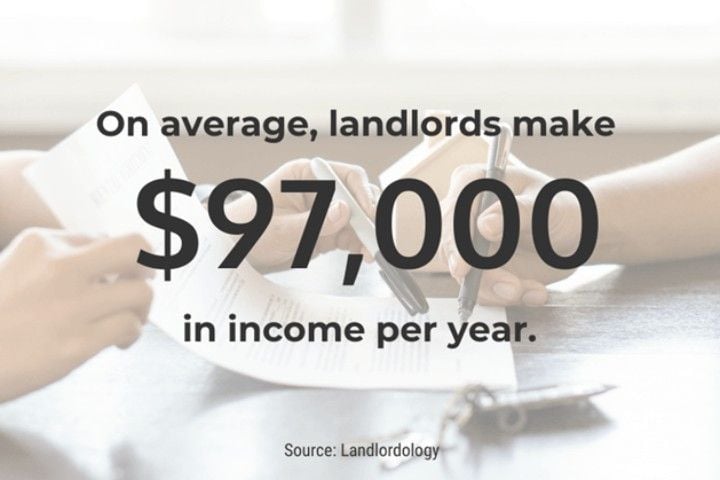So, you’ve invested in a rental property, and now you want to start leasing it out. With so many different aspects of renting to consider, it’s easy to get overwhelmed. From creating a lease and establishing processes for managing tenants to finding renters in the first place, there truly is a lot to keep track of as a landlord. However, you shouldn’t let that discourage you.
After all, becoming a landlord can be a lucrative business venture if you know how to manage your listings effectively, maintain the property, and keep your rentals occupied. That might seem like it’s easier said than done, but you can do it. And trust us, it’s worth it—according to Landlordology, landlords make an average income of $97,000 per year.
When you’re getting started as a landlord, careful planning, organization, and following proven steps to success can make things much more manageable. The first step is to use this post to help you become a successful landlord.
Figure Out How You’ll Manage Your Rental
You have the property, but how do you turn it into a rental? First, you need to make sure it’s move-in ready. Some of the essential items your checklist should include are:
- Checking for any needed repairs
- Ensuring it is clean and sanitized
- Determining how you will handle tenant requests and who will perform upkeep
- Taking high-quality photos of the empty rental
- Listing your rental (this may include sites like Zillow and apartments.com as well as social media sites)
You might also consider getting a fresh coat of paint on the walls in a white or light color. Light colors make the rooms look brighter and more open.
You may also want to get the property professionally cleaned. Cleaning companies aren’t very expensive, can work around your schedule, and make the property much more attractive to prospective tenants. Consider steam cleaning the floors and carpets.
If you have problems with pests in or around your property, a pest control company can treat the area for insects. No prospective tenant wants to see spiders or roaches in a tour of a home or office.
You should also clean all of the windows, ensure all appliances are in working order, and replace or clean heating and air conditioning filters.
You should also carefully consider whether you want to handle everything on your own or if you’re going to want most of the responsibility off your plate. One option is to delegate rental management to a property management company. You could get help with some of the responsibilities by having a reliable tenant take care of things on-site, like collecting physical rent, coordinating conflict resolution, and more. If you choose the latter, make sure you have an agreement, and the individual is capable, willing, and trustworthy.
Get a Rental Property Insurance Policy
Rental property insurance, also called Landlord insurance, protects your rental property against damage. This type of insurance covers risks that a typical homeowners policy does not. Mainly, it protects you against tenant property damage and tenant liability. A homeowners policy may insure the home against storm damage, for example, but it will not insure you against damage caused by a tenant or provide liability coverage for injuries to tenants on the property. The scope of the insurance depends on the type of property – whether it’s a residential home, apartment complex, commercial property, or office. An independent insurance agent can help you determine the type of insurance you may need.
Establish a Solid Lease Agreement
One of the most important documents you’ll rely on as a landlord is the lease agreement. It might seem like a good idea to just take a lease template you’ve found online and recycle it, but it’s important to make sure you have a thorough lease that covers all your bases. In many cases, it might even be worthwhile to have a lawyer review it. While it might cost you a little more right now, it could save you in legal fees later since you’ll be able to avoid most disputes, hopefully.
What should your lease cover? At a minimum, you should have the following clauses in your lease agreement:
- Subletting clause
- Lease termination clause
- Liability clause
- Security deposit clause
- Tenant responsibilities clause
- Late fee clause
- Use of premises clause
- Lease renewal clause
This is just a short list, but it’s a good start in the right direction. You may also want to require that your tenants have renters insurance. Some other things to consider including in the lease agreements are:
- A pet deposit if you allow tenants to have pets on the property
- Yard maintenance
- Utilities the tenants are responsible for
- Allowing access to the property for regular maintenance inspections and emergencies
Learn more about the other forms you’ll need with SmartMove’s’ guide to important landlord documents.
Provide Added Value to Your Tenants
What attracts tenants to one rental over another? What keeps tenants in the same rental for long periods of time? The answer to both these questions can include a range of things that can be categorized into amenities and added benefits. Updated appliances, hardwood floors, access to a pool or gym—the list goes on and on for the types of amenities you can offer (some easier to accommodate than others). However, when it comes to providing added value to your tenants, that can be a bit harder to define.
Some examples of added benefits include helpful resources, a dedicated maintenance team on-call, hands-off trash services, and more. While the last two are pretty self-explanatory, here are some examples of additional resources you can provide to make life easier for your tenants:
- Helping coordinate their move. For example, you can set up an arrangement with local movers to provide discounted services to your tenants in exchange for referring them to the business. This is especially true if your target group of renters is students. For example, in Durham, North Carolina, you can capitalize on being near Duke University and UNC and establish a relationship with a moving company that will make it easier and more enticing for renters to lease with you.
- Online payment portals. Paying rent isn’t necessarily something your tenants will look forward to, but that’s especially true if they have to deliver the check to your door. Setting up a convenient online portal that your tenants can pay rent through will make the process much smoother for both parties.
- Easy maintenance system. When maintenance issues like leaks, faulty light fixtures, and worse occur, you want to have a quick and effective response from your maintenance team. One way to make sure that happens is by providing your tenants with the ability to make online maintenance requests, provide an emergency maintenance number, and have a system in place for maintenance dispatch.
- Offer community events. If you happen to be the landlord of all the units, you could organize community events for your tenants. These could be as simple as a small BBQ by the pool or an Easter egg hunt for the kids. While it might not seem like much, helping to facilitate a sense of community can help you retain long-term renters.
Take On Tenants With Care
For many new landlords, the prospect of having a renter start paying ASAP is the main objective. However, it’s important to keep in mind that not all renters are people you want as your tenants. From disturbances that will interfere with other renters to dealing with someone who never seems to pay their rent on time, many things can go wrong with a troublesome tenant.
But what can you do about it? Here are a few tried-and-true practices that other landlords have benefitted from:
- Screening prospective tenants before completing the lease (you can see past evictions, credit history, etc.)
- Setting a minimum credit score (and standing by the policy)
- Meeting prospective tenants in person before approving their application (this way, you can get a feel for their personality to see if it’s likely they will be difficult to communicate with)
According to an analysis completed by the Eviction Lab at Princeton University, 3.6 million eviction cases are filed each year, and it’s not an easy process. This means that countless landlords have to deal with the difficult process of evicting residents. To help you avoid the stress of an eviction and protect your investment, it’s important to follow the above recommendations.
Start Off On the Right Foot
Figuring out how to navigate your new role as a landlord is a learning process. However, by focusing on these core concerns, you will save yourself a lot of time and frustration when getting ready to take your first tenants. Over time, you will also be able to improve upon your processes and approach to being a landlord to make them as simple and efficient as possible—something both you and your tenants will appreciate.
Finding Help with Moving Professionals
We hope you found this blog post Complete Guide to Becoming a Successful Landlord, useful. Be sure to check out our post How To Create A Profitable Rental Property for more great tips!
Have Experience in the Moving Industry? Want an Additional Income Stream? Work With All Around Moving!
All Around Moving’s Work With Us program provides experienced moving consultants with the opportunity to run their own Relocation Consultant business from anywhere in the USA. We provide licensing, dedicated phone lines and email hosting, moving software for lead tracking, invoicing, and complete set up.
We’ll even provide the carriers, or you can use your own. A nominal one-time start up fee gives you initial-customer-leads to get your business up and running. There are no recurring expenses, except purchasing your own leads. We share profits 50-50 with you from all jobs you book with us. Click here to learn more.






